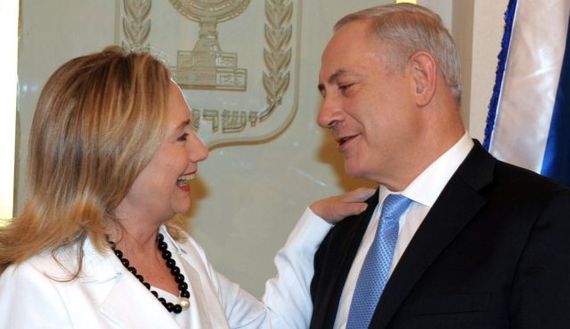Have you been wondering why Hillary Clinton has been so silent as the Obama administration and newly-reelected Prime Minister Benjamin Netanyahu have been at each others throats? Presumably, a presidential candidate leading every other Democratic challenger for the nomination would have something to say on such a monumental U.S. foreign policy issue. The subject is Israel for god's sake, not the island nation of Guam!
Well, now we know. In a late-night statement, Malcolm Hoenlein -- the Executive Vice Chairman of the Conference of Presidents of Major American Jewish Organizations -- told media organizations what Secretary Clinton supposedly thinks of the Barack-Bibi spat. The statement was as general and vague as words can be, but if you're a member of Joe-public like I am, it at least provides you with some sense of what Clinton is thinking.
"Secretary Clinton thinks we need to all work together to return the special U.S.-Israel relationship to constructive footing, to get back to basic shared concerns and interests, including a two-state solution pursued through direct negotiations between Israelis and Palestinians," Mr. Hoenlein said. "We must ensure that Israel never becomes a partisan issue."
This is about as safe a remark Hillary Clinton could have given. What prospective 2016 presidential candidate doesn't want to improve the U.S.-Israel relationship? It's about as obvious as saying that the government should fight animal abuse. And what presidential candidate doesn't support a two-state solution to the Israeli-Palestinian conflict? Democratic and Republican presidents over a period of decades have argued that negotiating two states for two peoples is the only viable way to solve this intractable conflict. After all, there isn't a better alternative: Israeli annexation of the West Bank, a one-state solution, a three-state solution, or temporary, interim Palestinian governance over select portions of the West Bank and Gaza aren't exactly recipes for long-term stability.
But beneath the obvious, read between the lines and you come to an equally obvious conclusion: Clinton believes that the Obama administration is mismanaging relations with Benjamin Netanyahu, a man that has proven to be an incredibly difficult person to deal with (James Baker and Bill Clinton can attest to this) on issues as important as preventing Iran from attaining a nuclear weapon and establishing a democratic and demilitarized Palestinian state alongside Israel. Politically speaking, Hillary Clinton is trying her best to distance herself from an administration whose second-term foreign policy approval ratings are awful and a White House that staunch pro-Israel supporters in Congress and across the country are convinced has an interest in continuing the diplomatic crisis. Or as Abe Foxman, President of the Anti-Defamation League, said to The Jerusalem Post, "I am...troubled by statements now coming out of the White House."
It would be easy to chock up Hillary's maneuver as politics during the beginning of her presidential campaign and call it day. But there's something more to it than that: relations between a U.S. President and an Israeli Prime Minister are the worst they have been since the early 1990s. Bibi Netanyahu has a lot to do with this downward spiral, including his comments on Election Day about Arab Israelis streaming to the polls "in droves" and his remark about a Palestinian state being an impossibility during his tenure. But, to his credit, Bibi seems to have recognized that his comments were ill-conceived and counterproductive, and has gone as far as apologizing for being insensitive to the concerns of Israel's Arab citizens. For a man like Netanyahu, apologizing publicly is a big deal.
The White House, however, is unfazed by Netanyahu and has consistently expressed reservations about the Israeli Prime Minister's judgment and sincerity. From White House Press Secretary Josh Earnest and State Department Spokeswoman Jen Psaki to President Obama himself, Netanyahu is molded as an insincere politician who will do anything to save his job -- even if it means foreclosing a two-state solution that he previously supported and which Middle East experts, the U.S. and Israeli governments, and the Arab League have all acknowledged is the only way to assure that Israel is secure and the Palestinians are recognized as full members of the international community. One can perhaps understand the administration's reluctance to accept Netanyahu's about-face, but the White House isn't making matters easier by questioning the prime minister in public.
Hillary Clinton has a complicated relationship with Netanyahu herself. The two have gotten into shouting matches before when the former was Secretary of State (see this article from the Washington Post's Anne Gearon for context), most notably over Israeli settlements on land that the Palestinians consider part of any territory that they would be allowed to keep. But, by Hillary's own admission (see her memoir, Hard Choices), she was able to work with Netanyahu and stroke his ego when she needed to.
Until she is able to win a presidential election, we won't know for sure whether a President Hillary Clinton would have used the same tactics with Netanyahu as President Obama has for the past six years. But, based on her record as first lady, Senator from New York, and Secretary of State, one could come to the conclusion that she wouldn't have let her personal feelings with a world leader gather so much momentum that the state-to-state relationship itself was questioned.
Hillary Clinton sees an opening that she can exploit. If elected president, one of her first orders of business would be to turn a page on U.S.-Israel relations to a more "constructive footing." But first, she needs to win that election.

